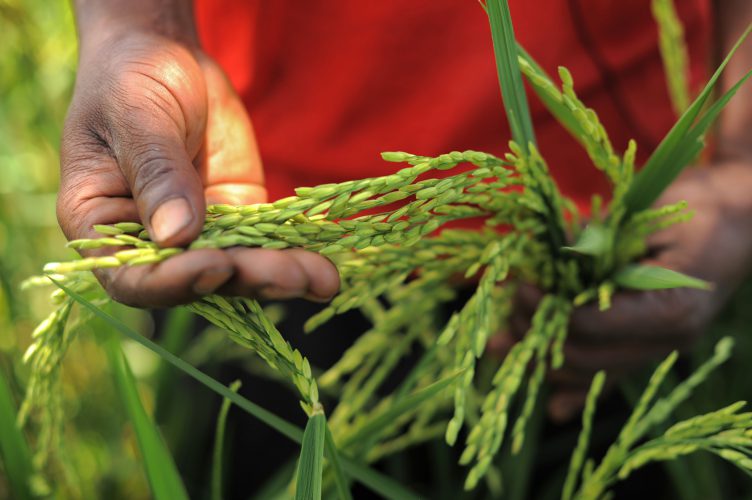Tanzanians who participated in the System Rice Intensification training shared their delightful stories of how implementing a new rice growing system improved their lives and wellbeing. These interesting experiences can be a motivation to others. Tanzania implemented a bottom-up approach resulting in a more inclusive initiative, which finally led to achieving a successful outcome. Tanzania is one of the participating countries in the “Partnership for Sustainable Rice Systems Development in Sub-Saharan Africa” project within the framework of South-South Cooperation. Though the project is still ongoing, Tanzania has achieved a tremendous impact on farmers in five irrigation schemes’ regional districts.
Besides Tanzania, the project supported Benin, Cameroon, Côte d’Ivoire, Guinea Conakry, Kenya, Mali, Nigeria, Senegal and Uganda. This project, overall sets to achieve the output of improved rice production and productivity, grain quality, technologies, policies, institutions and markets in the regions. On the other hand, achieving a reduced post-harvest losses.
The objective of this project is the realization of more efficient, sustainable and productive rice systems in the countries to increase food security and enhance sustainable development of the rice food chain among the smallholder farmers (particularly Tanzania in this case). Following this, Tanzania achieved training 150 youths (75 males and 75 females), and establishment of 20 demo plots, amongst others.
Rice is the second most consumed food in Tanzania. Rice production was about 3 million tonnes in 2017 and it has been on a rise since then, following the increase in the number of small-holder farmers engaging in the production of crops with modern practices and ways of farming.
Some challenges have faced rice farming in Tanzania like; the shortage of both conducive areas of rice production and, irrigation infrastructure. To address this, FAO in partnership with Ministry of Agriculture of Tanzania trained 150 youths on the System of Rice Intensification (SRI) and life skills in 2017 to tackle the challenges. Some of the participants shared their success stories of how the process helped them and their production.
Success Stories
Thanks to the impact created by the project, a number of individuals decided to share their story of how the new rice system changed their lives and that of their families. These stories are very motivating for other farmers who would be encouraged to adopt the process as well.
Belth Fredrick Ndikwege, a farmer from Njage village said that, after the SRI (System of Rice Intensification) training in 2017, in the first year of applying what she learnt, she got 39 bags of paddy while in the second year she got 35 bags and all these worth a lot in Tanzania. After the second year, she and a number of other farmers formed a group called “Kaza Mwendo” and established a demonstration plot which they used to further train farmers in their village. With the profit she got, she was able to start her hair dressing salon which made even more profit for her.
Muhesa Kazumba, a farmer from Morogoro said that, with the SRI training he has developed financially. He got 45 bags of paddy from one acre of land. Due to how successful he was with his rice productions, the village people began to accuse him of using magical powers in farming and he was not able to rent the land for a second time. As a result he had to get a land in a different area to continue his farming. With the profit he got from the produce, he was able to buy a piece of land, bricks and started building his house. With more of the produce being sold, he was able to complete the building.
Khalid Mbena, another farmer from Morogoro said that he was inspired by fellow youth who were trained during the SRI. He joined them and learnt the new techniques from them. He learnt by doing and was able to apply his newly acquired knowledge on his own farms. He usually gets around 7 bags but after he learnt the SRI techniques, his harvest increased to 23 bags from an acre.
Godfrey Pascal, another farmer, said that he got more paddies from his farmland after the SRI training and like Muhesa Kazumba, his village members believed he used magical powers and he magically transferred their crops to his farm. The profit he has gotten from practising SRI has helped him to afford health insurance for his 4 children, his wife and himself. He has also been able to build his house. In 2017, he won the best farmer for the year award for Kilosa district and Morogoro region.
Elizabeth Stephano, a farmer from Mbogo-Komtonga scheme said that after the training, she applied the knowledge on her farm and she was able to get 10 bags from a half acre of land which previously produce only ¾ bags.
During the project’s workshop, Tanzania made a video of the success stories which generated the project off in the country. This also shows that documenting a project’s impact in a given region will help motivate more people, draw some lessons learned and capitalize on positive experiences.

